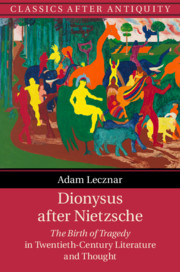Book contents
- Dionysus after Nietzsche
- Classics after Antiquity
- Dionysus after Nietzsche
- Copyright page
- Epigraph
- Contents
- Series Editors’ Preface
- Acknowledgements and Dedication
- Introduction
- Chapter 1 Corybants, Satyrs and Bulls
- Chapter 2 A Great Kick at Misery
- Chapter 3 In Search of an Absent God
- Chapter 4 What Oedipus Knew
- Chapter 5 Dionysus in Yorubaland
- Conclusion
- Bibliography
- Index
Chapter 4 - What Oedipus Knew
Richard Schechner
Published online by Cambridge University Press: 27 March 2020
- Dionysus after Nietzsche
- Classics after Antiquity
- Dionysus after Nietzsche
- Copyright page
- Epigraph
- Contents
- Series Editors’ Preface
- Acknowledgements and Dedication
- Introduction
- Chapter 1 Corybants, Satyrs and Bulls
- Chapter 2 A Great Kick at Misery
- Chapter 3 In Search of an Absent God
- Chapter 4 What Oedipus Knew
- Chapter 5 Dionysus in Yorubaland
- Conclusion
- Bibliography
- Index
Summary
Though the main figure of this chapter is the American theatre director and theorist Richard Schechner, it ranges widely in its attempt to understand the philosophical implications of the irrationalism that Nietzsche makes a central part of his vision of ancient Greece. Focusing on Dionysus and Oedipus in The Birth of Tragedy and beyond, it argues that the latter mythical hero represents the negative and harmful consequences of irrational, ecstatic knowledge and experience. After a detour through writings of Freud, Lévi-Strauss and Derrida on this subject, the chapter returns to Schechner and to his iconoclastic production Dionysus in 69. The version of Dionysus that emerged from this performative experience was connected to the contemporary discourse of the Dionysiac that expressed so many of the revolutionary and counter-cultural tendencies of the 1960s. In this way the chapter explores the way that Nietzsche’s Greeks underwrote some of the major symbolism of this significant cultural moment.
- Type
- Chapter
- Information
- Dionysus after Nietzsche<I>The Birth of Tragedy</I> in Twentieth-Century Literature and Thought, pp. 130 - 160Publisher: Cambridge University PressPrint publication year: 2020



